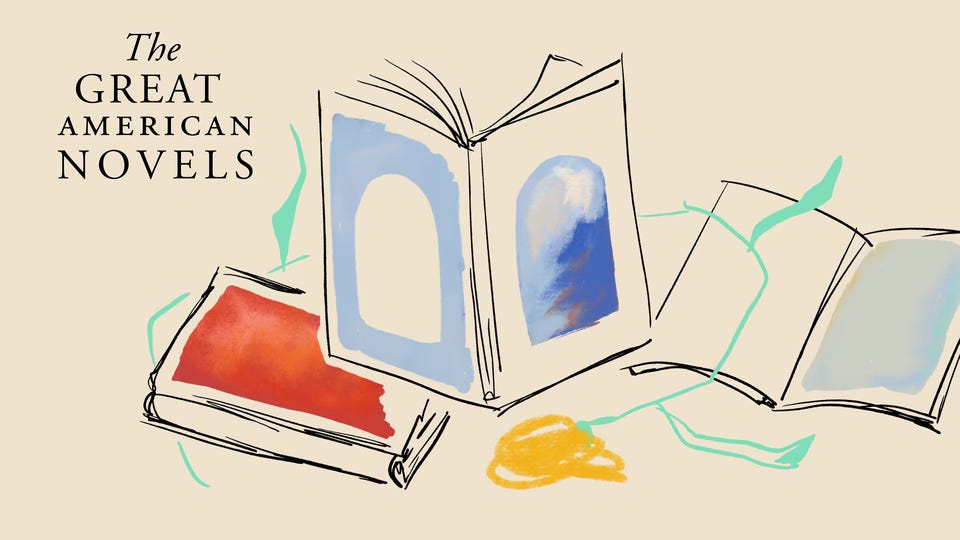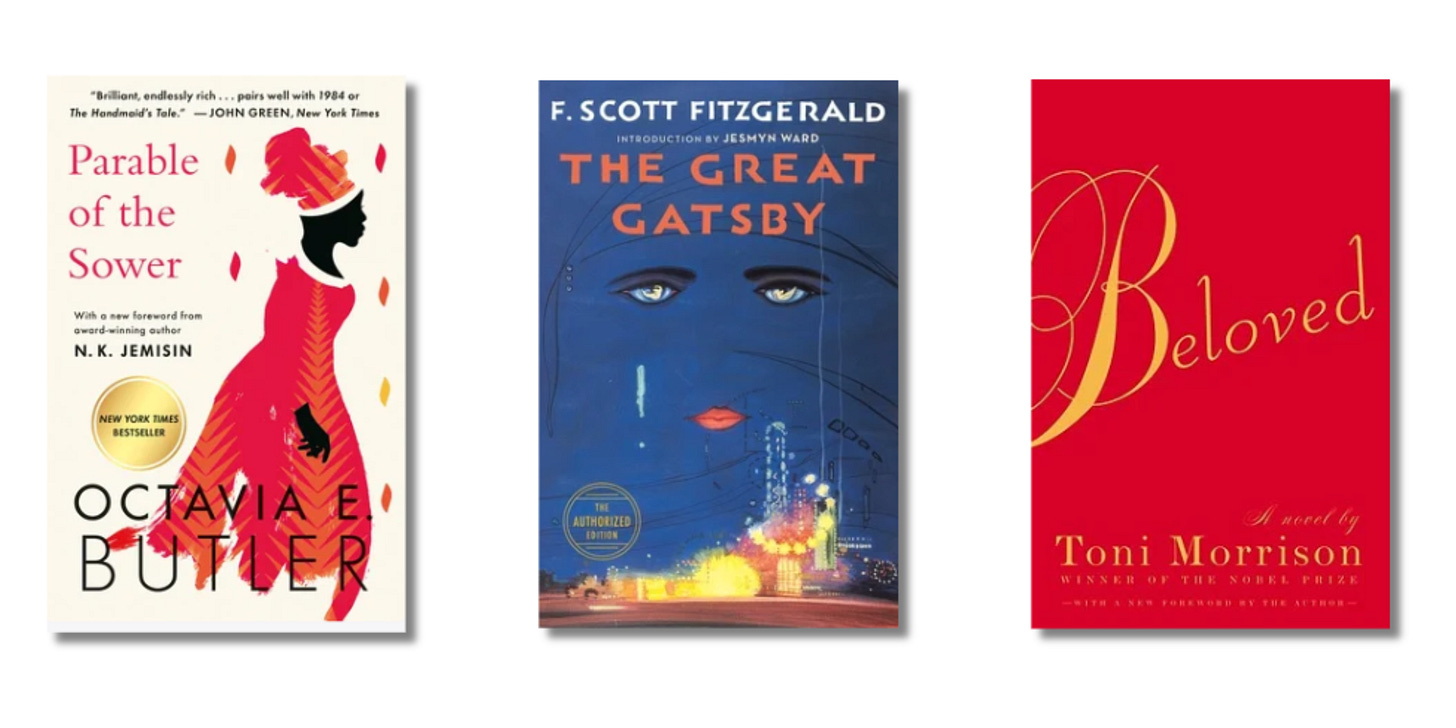Reading in Public No. 34: What makes a Great American Novel?
Themes and patterns from a century of American literature
Like the rest of the bookish world, I spent the end of last week pouring over The Atlantic’s list of Great American Novels. I want to say up front, that I actually love this list. I have only read 45 of the 136 books. I’m familiar with or have sampled many more, and there’s a slew of books I have never heard of. To me, that’s what makes a great list! The books I love alongside largely well-regarded books vouches for the books I don’t know and makes me eager to pick them up. The Atlantic editorial staff said they want this list “to replicate that particular joy of a friend pressing a book into your hand and saying, ‘You have to read this; you’ll love it.’” I think they nailed that.
What this list doesn’t do—at least in its prologue, though you can certainly find the threads as you read the book descriptions—is clearly define what a Great American Novel is. I think that’s okay. As they tell us, “the American canon is more capacious, more fluid, and more fragile than perhaps ever before.” Trying to define what a distinctly American novel is (let alone what a “great” novel is) would require an article, or book, of its own. And letting the books speak for themselves is smart! It allows readers to enter each novel wondering what might be particularly American about it, what it’s saying about this vast and complicated country, and what literary elements it’s bringing to the American canon.
But I’m now utterly consumed by my own internal dialogue trying to answer the question, what makes a Great American Novel (GAN)? This was something we often discussed in my American literature class, and I have lots of thoughts on the books that have historically been regarded as GANs. Much of how I think about American literature is in opposition to British literature, both because that’s how early American writers thought of it themselves and because I taught Am Lit to students who’d previously taken Brit Lit—the comparisons were easy to draw and essential to make. I do a little of that throughout this piece too, though I’m certainly not saying that only American literature explores the topics I’m discussing.
Over the course of decades of teaching and reading, I’ve developed some large scale thoughts on what I’m looking for in a Great American Novel, mostly in regards to common themes in American classics that are then expanded, questioned, and subverted in great contemporary literature. Very few books do all of this (that would get messy in the hands of most writers) and of course there are things my list is missing. There are also undoubtedly Great American Novels that are completely outside the parameters I’ve concocted. But in spite of the slipperiness, it’s still a fun and worthwhile concept to consider. So today I’m exploring some patterns I’ve noticed and drawn upon in my own growing understanding of the Great American Novel.
But more than anything…I want to know what you think makes a Great American Novel. Whether you read the rest of this essay or just skip to the comments, I want to know what you thought of this list. What would you remove? What would you add? What does a Great American Novel mean to you?
1. They wrestle with the founding sins and ideals of America as a nation.
Many American Literature classes begin with some of the founding documents, letters, and narratives of American history—the Declaration of Independence, the Preamble to the Constitution, Benjamin Banneker’s letter to Thomas Jefferson, Mary Rawlins’ captivity narrative, John Smith’s (absolutely bonkers) autobiography. These texts are taught in literature class not necessarily because of the great writing (though there is some great writing), but because they set up so many of the themes that American fiction goes on to wrestle. These texts establish the founding ideals of freedom and equality, call those very ideals into question, celebrate a spirit of individualism and adventure, and establish motifs of land and exploration. They also reveal the many founding sins of the America as a nation. Classic writers like Nathaniel Hawthorne and Mark Twain—whose works are too old to qualify for the Atlantic list—wrestled with these dueling forces centuries ago, and newer Great American Novelists like Louise Erdrich and Colson Whitehead continue that today. Last year alone we had at least three fantastic examples of books that explored these tensions in Lauren Groff’s The Vaster Wilds, Jesmyn Ward’s Let Us Descend, and Teju Cole’s Tremor. Because America at large doesn’t particularly like to dwell on past mistakes, our artists continue to find provocative ways of encouraging readers to look back and reckon with the atrocities that built and shaped America.
2. They convey a sense of nostalgia.
The American ethos is particularly steeped in nostalgia and that is very much reflected in classic American literature. Think about the last line of The Great Gatsby, “So we beat on, boats against the current, borne back ceaselessly into the past.” Or the Octavia Bulter-coined, Trump-appropriated campaign line “Make America Great Again.” Whether it’s from buy-in to our founding myths or our shortsightedness as a relatively new nation, Americans love to romanticize the past.
In literature, this is often depicted as the nostalgia of the individual (see points four and five), but this still can still work allegorically to evoke the ethos of the nation and sentimentally to engulf the reader in homesick yearnings. We are supposed to deeply feel the longing of Jay Gatbsy and Jim Burden (My Antonia is very much a GAN, but missed the cutoff by 7 years), while simultaneously knowing that they can’t go back, and neither can we. These books feel so different to me than British novels that also explore our relationship to memory. Where books like Atonement, The Sense of an Ending, and The Remains of the Day deal in idealized memories, these books feel more concerned with the ways these memories fail their characters rather than the homesick feeling of looking back at one’s past.
It’s interesting to speculate about what might make Americans so distinctly nostalgic, but it’s also important to consider who nostalgia serves and the ways in which authors are pushing back against that. A book like Beloved is the perfect example. Like so many Great American Novels, it explores the way the past grasps and clings to its characters. Morrison even plays with the trappings of nostalgia by naming the fictional plantation Sweet Home and describing it with a mix of beauty and horror—she gives us homesicknesses and infuses it with a haunting.
3. They engage with and challenge foundational American myths and ideologies.
One of the first texts we read in my American Literature class was the City on a Hill speech in which John Winthrop said about the Massachusetts Bay colony, “For we must consider that we shall be as a city upon a hill. The eyes of all people are upon us.” By this he meant that their colony would be a model and test of Christianity, but this phrase has come to embody the larger ideology American exceptionalism. It’s hard to think of any truly Great American Novels that buy into this narrative—that would probably look more like propaganda than literature, but a lot of American texts seem to be thinking about or butting up against this American myth.
Another key American myth that GANs engage with is, of course, the American Dream. When I asked my Instagram audience what came to mind when they thought of distinctly American fiction, the phrase “the American Dream” came up far more than anything else. People have varying ways of defining and explaining this term, but, to generalize, it’s the ideology that America offers equal opportunity—that anyone can make their own way and better their life (specifically economically) with grit, hard work, and determination. It’s likely that the first American Dream novel most readers think of is the very first novel on the Atlantic list: The Great Gatsby. While Gatsby isn’t my favorite book, I do think it very much qualifies as a GAN because of how it both glorifies and subverts the idea of the American Dream (just read any high school student’s final Gatsby essay if you don’t believe me). But it is certainly not alone in its depiction of how the pervasiveness of this ideology can isolate and corrupt.
Another myth that I think we’re seeing tackled explicitly in some wonderful contemporary fiction is the idea of America as a “melting pot” of peoples and cultures. There’s so much wonderful fiction on the Atlantic list like Under the Feet of Jesus and Americanah that completely eviscerate the melting pot myth.
4. They are concerned with the individual and individualism.
American literature is much more likely to explore the internal and external struggles of an individual than of a community—and to focus on the cultivation of an individual identity. In my browsing, I noticed that The Atlantic list doesn’t include many “community novels,” even from writers who have penned those types of work. Louise Erdrich’s The Round House, for example, has a spot over Love Medicine or The Night Watchman. Even the books with multiple points of view are more focused on several distinct individuals rather than depicting the ecosystem of a community. We are a highly individualistic country, and I think we see that both in the craft of American literature when it comes to story arc and point of view, as well as thematic explorations of the angst and loneliness that can come with such a hyper focus on the individual.
As a total side note and something I’d never considered before, I now think it’s kind of fascinating that some of the most popular British classics in America fit this same trend—Jane Eyre and Great Expectations are more widely read here than Wuthering Heights and Middlemarch.
5. They explore the concept of the “self-made man.”
Protagonists in Great American Novels often practice the art of self-invention—not only or always in the “pull yourself up by the bootstraps,” American Dream kind of way, but in the actual act of inventing a self to dress up in. There is so much self-mythologizing and reinvention in classic American literature, and because of this, the idea that you can be whoever you want to be or start over any time, feels deeply American to me.
Once again I have to refer to the king of reinvention, Jay Gatsby. But characters like Claire in Passing and Sethe in Beloved are also performing a type of self-invention, and what is Lolita if not a grande satirical act of self-mythologizing? I also see this theme in more modern books like Teju Cole’s Open City, Imogen Binnie’s Nevada, and Ling Ma’s Severance. While Americans are obsessed with the past and the way it tethers us, we also seem to believe in—or want to believe in—our ability to shed our skin and become someone new.
Tell me your thoughts! I want to hear all of your Great American Novel musings in the comments below!!
For questions, comments, or suggestions, please don’t hesitate to reach out by emailing fictionmattersbooks@gmail.com or responding directly to this newsletter. I love hearing from you!
This email contains affiliate links. If you make a purchase through the links above, I may earn a small commission at no additional cost to you.
If you enjoyed today’s newsletter, please forward it to a book-loving friend. That’s a great way to spread bookish cheer and support the newsletter!
Happy reading!
Sara








Y’all. I DID NOT KNOW that Octavia Butler coined MAGA 🤯
I really enjoyed reading this, as well as perusing the Atlantic list. Almost feels like it’s begging to be a new reading project… 👀